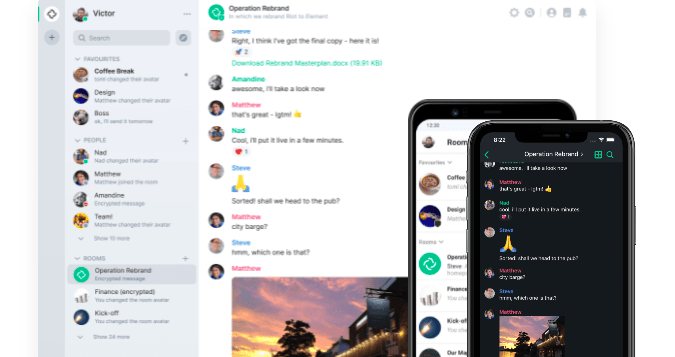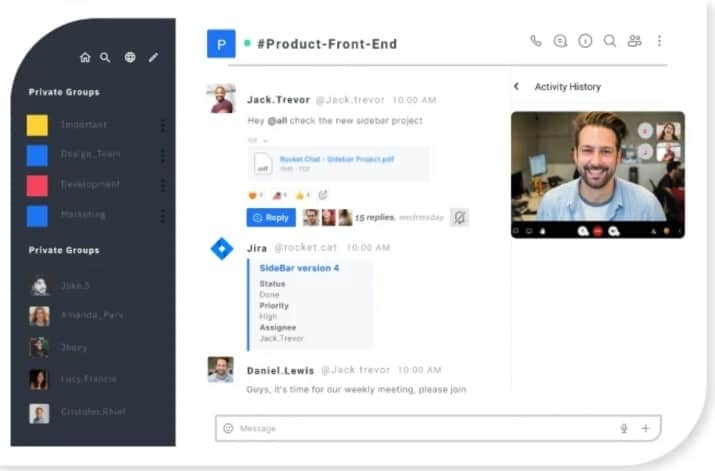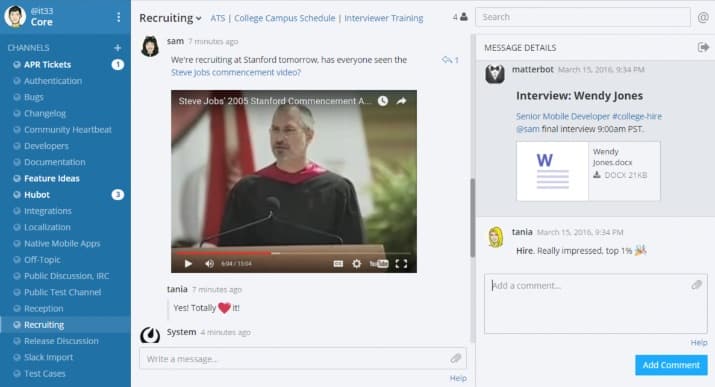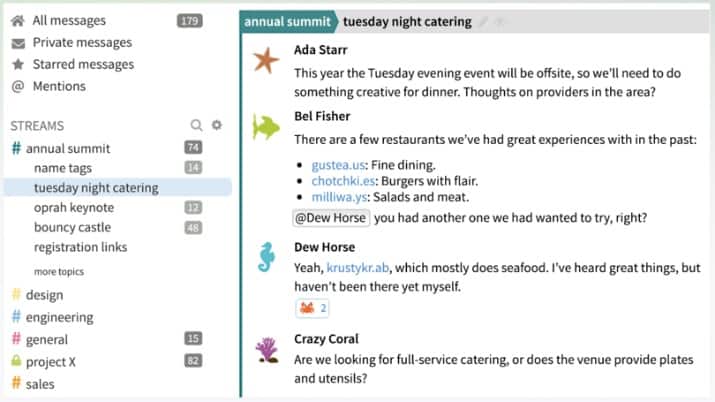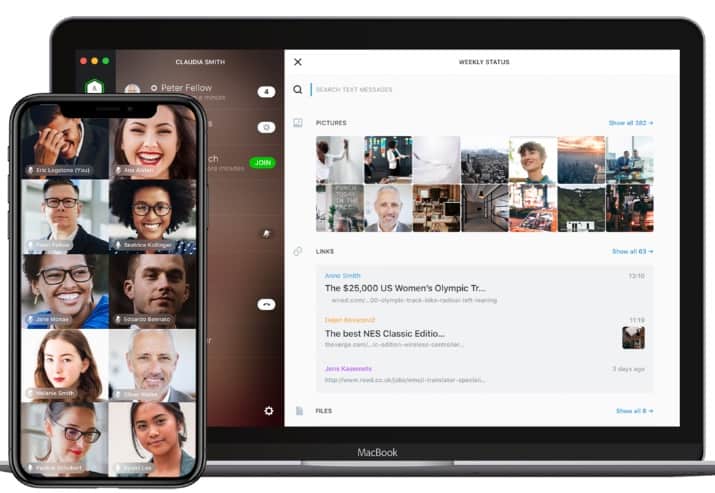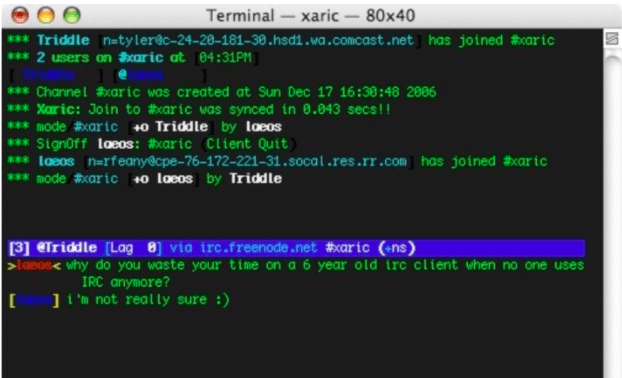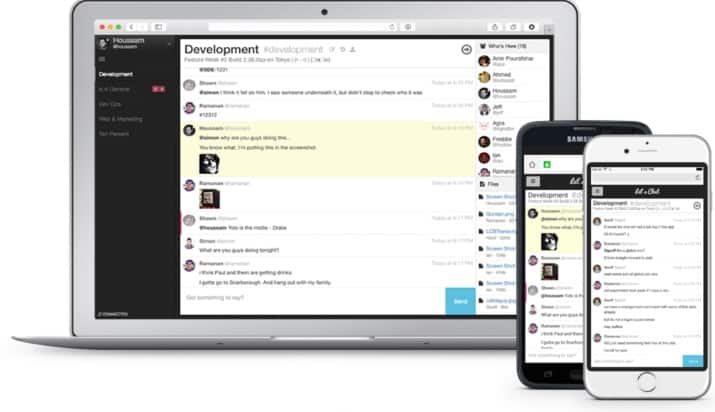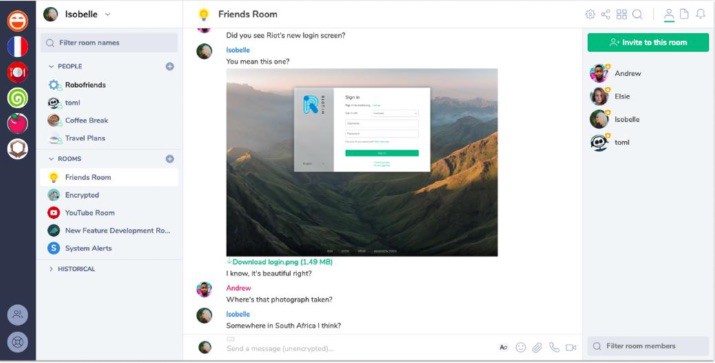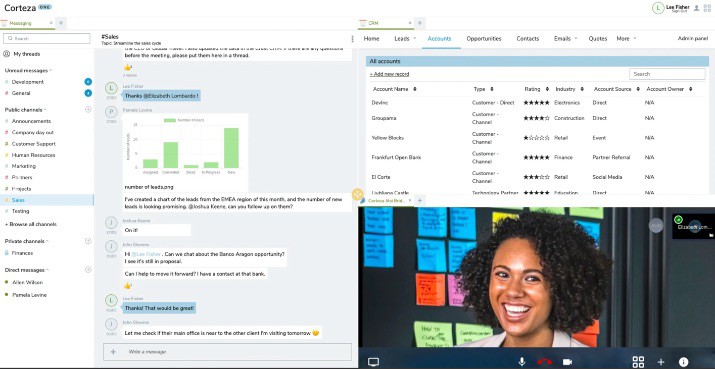Many teams and organizations use Slack as an internal company chat tool because it’s easy to sign up for, enables fast-paced collaboration, and it integrates with many third-party apps.
While Slack may be one of the best go-to platforms for real-time chatting and collaboration, it has a few flaws. To begin with, Slack isn’t self-hosted, and after going public, the focus shifted to enterprise customers in a bid to be more profitable.
Not only that, but Slack messages can also get disorganized and chaotic especially where there are several people collaborating on a project via chat. The information you’re looking for can quickly get buried within a barrage of chats, and it can be hard to keep track of what’s happening.
On top of that, Slack can be shallow compared to using face-to-face meetings, so it’s harder to use instant or group messages for substantive conversations.
Slack also has many of the addictive qualities of social media with push notifications and emojis, meaning your team may end up spending more time checking their notifications and messages than actually doing the work.
If you want an open-source business solution tailored to your team, check out these best open-source Slack alternatives.
Best Open-Source Slack Alternatives
1. Element
Element, formerly Riot.im, is an open-source tool with a collection of web and mobile tools that make for open, secure, and decentralized communication.
Its web client is hosted, meaning you don’t get to install anything, but if you want a dedicated app, you can get a client for that. Plus, you can use Element to integrate and interconnect with other services using Telegram, Slack IRC or Gitter, and others so you can replace multiple other clients with one open-source solution.
Element connects to Matrix, an open standard software to provide end-to-end encryption for all your messages, which makes it a security-first solution.
Like Slack, you get features like channels, private messages, and web, desktop, or mobile apps for iOS and Android in Element. However, Element goes further to provide more features like Notes, Chat bridging, video and audio calls, and a comprehensive message search.
Element also has a modern interface so you can favorite the channels you use most or like so as to stay updated. On Slack, you would have to join the channel you use most in order to get updates, but you’d also have to change the settings to get notifications on your device.
Plus, the tool also bridges with Slack so you can still collaborate with your team without leaving Slack.
Element is completely free to use on public servers like Matrix or your own servers.
2. Rocket.Chat
Rocket.Chat is an open-source and free chat collaboration platform that you can use to communicate in real-time and securely across devices on desktop, web, and mobile.
The tool is also made for customer engagement and DevOps to keep the workflow going as it centralizes all your touchpoints and tools in one platform.
This centralization of project communication ensures you don’t miss any information and your team gets to work better as all customers, suppliers, and partners are connected to Rocket.Chat.
One of its best features is that it’s easy to migrate to, provided you export your files from HipChat or Slack and upload them to Rocket.Chat.
You also get other useful features like live chat, real-time translation, and end-to-end encryption, which makes it a worthy contender to Slack.
The advanced tool also offers integrations, customizability features, tiered permissions, channels direct messages, voice and video calling via Big Blue Button and Jitsi.
The only difference here is that Slack only offers one-to-one video conferencing in its free feature, while the paid plans offer video calls for a maximum of 15 participants.
Rocket.Chat is self-hosting supported, unlike Slack which is hosted. Plus, Rocket.Chat has an intuitive and easy experience with its interface, allows you to favorite channels and people, and clone Rocket.Chat on GitHub to deploy on your cloud server.
In terms of pricing, Slack is free for an unlimited number of users, Rocket.Chat is only free for up to 1,000 people. Moreover, Slack’s paid plans are costlier at $6.67 per person for the standard plan and $12.50 for the Plus plan compared to Rocket.Chat, which is $3 for its Pro plan.
3. Mattermost
Mattermost is another open-source Slack alternative that’s compatible with Slack but isn’t Slack-limited. The tool has features you’d find in Slack including compatibility with Slack integrations and supports a superset of its incoming and outgoing webhook integrations.
However, unlike Slack, which is hosted, Mattermost is self-hosted and brings all your team communication in one place.
You can also search and access everything from Mattermost anywhere, import users, theme setting colors, and public channel history from existing Slack teams.
You can also use Mattermost from your mobile device, the web, or with installed apps on Mac, Windows, and Linux. The software is easy to deploy, manage, and upgrade as it runs in many forms including as a Docker image or Linux library.
Mattermost is also backed by a vibrant community with dozens of integrations and apps including Hubot, GitLab, Jira, IRC, and many others so you can build and share your apps using its APIs and drivers.
The tool also supports full markdown in messages, providing developers with powerful and easy-to-use formatting.
Like Slack, you get threaded messaging with Mattermost, which allows you to track complex discussions and comment on previous messages.
A reply button is included so you can comment on any previous message and see comments on a threaded message. Slack provides this feature in its desktop and mobile apps, but you don’t get to see the thread comments on the side in the mobile app.
Mattermost also offers searchable hashtags, which you don’t get in Slack. This feature helps teams stay organized through click-searching on hashtags to help you categorize messages as you would on Facebook or Twitter.
Other features you’ll get with Mattermost include fast and easy formatting for easier consumption of information.
The tool also offers multi-language support, private cloud development, which isn’t provided in Slack, theme matching, friendly channel names, and syntax highlighting.
4. Zulip
Zulip is an open-source group chat tool that combines real-time chat with an email thread conversations model for better productivity. You and your team members can catch up on important work conversations and get more done.
While Slack lacks message organization and context, which makes reading messages quite inefficient, Zulip offers an asynchronous communication structure that’s fundamental to how work happens today.
Zulip also provides unique threading, which works intuitively and saves you time in working with distributed teams across different time zones. Plus, you get real-time chat and a highly effective threading model where each stream (channel) has a topic just as each email message has a subject line.
In Zulip, topics hold conversations together just as subject lines in emails hold conversations together. This way, you can catch up on messages and reply in context no matter when the conversation started.
Zulip also changes how you operate and communicate in the organization as leaders get to prioritize time to batch-reply to messages, or move discussions from meetings and email to chats.
Plus, remote workers get equal participation, and your team doesn’t need to be glued to their phone or keyboard to avoid missing important conversations.
Like Slack, Zulip offers apps for all platforms including desktop, web, and mobile platforms. You also get inline images, emoji, emoji reactions, tweet and video previews, drag-and-drop file uploads, code blocks, and markdown optimized for chat.
The open-source software is built and supported by a vibrant 700-strong global developer community and provides seamless integrations with over 90 native integrations. Zulip’s user interface may not be as good as Slack’s but it still meets the needs of most of its users.
You can install Zulip on your server or use it as a hosted solution for free, unlike Slack, which is just a hosted solution.
5. Wire
Wire is an independently audited, 100 percent open-source alternative to Slack that touts itself as the most secure collaboration platform.
The software offers the most comprehensive collaboration suite with features like file sharing, voice and video calling, messenger, and external collaboration all with end-to-end encryption.
The software doesn’t compromise on security as it offers the strongest encryption for organizations that want to protect their document sharing and communications. This way, you can talk, message, and share documents with your teams and clients confidently through a single app on any device.
Wire is also built to scale to tens of millions of users and is CCPA, ISO, GDPR, and SOX-ready. Unlike Slack, which is hosted, Wire can be deployed in the cloud, on-premises, or private cloud. This gives you the freedom to deploy the secure cloud collaboration solution your way.
You also get three different solutions with Wire: Pro, Enterprise, or Red. The Pro solution provides one tool to consolidate all your collaboration needs, while the Enterprise solution is for large-scale or regulated organizations, and the Red solution is for unique on-demand crisis collaboration.
Wire’s secure, real-time messaging is stronger than Slack or other messaging and collaboration platforms as it secures all documents, images, and messages with end-to-end encryption.
One Wire account can work on up to eight devices with messages encrypted for every device and for maximum security, you can verify each conversation partner’s device fingerprints.
While Slack and Wire are both built with different users in mind, they’re also priced differently. Wire is more affordable with its Pro plan going for $5.83 and the Enterprise plan runs $9.50 per user per month.
6. IRC (Internet Relay Chat)
Internet Relay Chat, popularly known as IRC, is an open-source way of communicating with people from all over the world in real-time. The tool consists of separate networks of IRC servers that let people connect to the chat.
You’ll notice that it’s similar to text messaging, but unlike Slack, which is useful for teams from an organization, IRC is designed for large groups of users instead of one-on-one.
IRC’s protocol dates back to 1988 and features a set of conventions, rules, and client or server software. The software can be used on PCs and other devices, and you can start a chat group or channel, or join one that already exists.
While you don’t hear much of IRC today because of the likes of Slack and social media, it’s far from dead. In fact, now may be the best time to get back to IRC’s text-based chat revolution.
The platform has a dated user interface compared to Slack’s interface, but it’s still a great way to talk to anyone across the world and share news, find love, or talk about any topic in real-time with like-minded enthusiasts.
Compared to Slack, which is designed for team collaboration, IRC is ideal for basic chatting online. Plus, IRC provides anonymity that you won’t find on Slack and other similar chat and collaboration tools on this list, so you can exist online without judgment.
IRC is free to use and you can get it on desktop, web (Chrome), iOS, and Android devices. Connecting is as simple as downloading an IRC client or installing it from an app store, type the name you want, and you’ll get a list of IRC servers to use.
The challenge with IRC over using Slack is that the former has plenty of potentially offensive content, unlike Slack where you can regulate the kind of discussions that are allowed or disallowed.
7. Nextcloud Talk
Nextcloud Talk is open-source software for sharing and collaborating on documents, sending and receiving emails, managing your calendar, and having video chats without data leaks.
Unlike Slack, which is hosted, Nextcloud Talk is a fully on-premises solution that offers the benefits of online collaboration without risks of security or compliance.
You can get more done through its clean interface, decrease travel costs as you can meet as much as you want, and build better relationships working together in real time.
You also get to control what happens on the platform as the calls are end to end encrypted on your own server. Nextcloud Talk is easy to get started with as you simply install, invite your team members, and call in with one click whether on a mobile or web client.
The platform receives constant improvements from a transparent and thriving open-source community development model.
Plus, no matter where you are, you can improve team productivity as you can share, collaborate, and chat across boundaries with transparent access to data on any storage.
All your communication is protected better than it would be on Slack as your data remains on your servers, not other hosted servers. The tool also keeps metadata from leaking and ensures you stay in control of communications.
The fully self-hosted tool offers audio/video and chat communication like Slack, and message status indicators to show when a message is received or sent.
Nextcloud Talk also has a whiteboard app that you can use during video or voice calls, and also within your chat sessions. This helps participants take notes, draw or write on the board, upload images, and present among other tasks.
You can connect your Talk rooms to other Talk servers or services like Slack, IRC, Mattermost, and Matrix among others through the Nextcloud Bridging feature.
Another nifty feature in Nextcloud Talk that you won’t find in Slack is video verification, which ensures that the identity of a person is verified before they’re granted access.
The software is also compliant with GDPR, CCPA, and more data and user privacy regulations to protect the confidentiality of communications.
8. Let’s Chat
Let’s Chat is an open-source Slack alternative that was started in 2012, which runs on MongoDB and Node.js. The persistent messaging application is designed to be deployed easily and fits with small yet intimate teams.
Let’s Chat is free and ships with features like bring your own server, LDAP/Kerberos authentication, multiple rooms, mentions and desktop notifications, file uploads, image embeds, and XMPP multi-user chat.
Plus, Let’s Chat offers private or password-protected rooms, a REST-like API, transcripts or chat history like on Slack, and it’s Hubot friendly.
The free MIT licensed chat app is a side-project of the Security Compass team and is designed to work with small teams, unlike Slack, which is now geared towards enterprise teams.
Plus, Let’s Chat is self-hosted, unlike Slack, which is hosted, and it’s free to use. The only exception is that Let’s Chat doesn’t support video calls out of the box, because it’s a side project of a development team, so it comes with limited functionality.
However, if you want basic chat functionality for a small or medium remote team, Let’s Chat is worth considering as it’s a more affordable alternative to Slack.
9. Matrix
Matrix is an open standard, open-source project for interoperable, decentralized, and real-time communication. The tool is Apache-licensed and maintained by the Matrix.org Foundation with an aim to create an independent, vibrant, and evolving platform for communication.
The protocol is suitable for use to power instant messaging, Internet of Things communication, VoIP or WebRTC signaling, and any other application that needs a standard HTTP API for publishing or subscribing to data.
Matrix is designed to fix the problem of fragmented IP communications so you can call or text each other without caring what app the other person is on.
This makes Matrix as easy to use as you would when sending an email for easier communication, and it empowers you to own and control your data while selecting the vendors or services you want to use.
Matrix is built on an open standard and bridges other networks into one decentralized network including Slack.
Plus, Matrix has an easy-to-use client for web, iOS, and Android, prioritizes messaging with the people as you would with Slack groups, and supports instant messaging among other kinds of communication.
Matrix’s client, called Riot.im, has an integrations app store, and you get full conversation history and end-to-end encryption.
Slack, on the other hand, is expensive compared to Matrix, especially when you need to upgrade, and its free option has a hidden maximum user limit. Plus, Slack is hosted and lacks end-to-end encryption, but instead provides audit logs, integration with data loss prevention services, and Slack Enterprise Key Management.
10. Corteza Messaging
Corteza Messaging is an open-source, high-performance, and secure Slack alternative that lets your teams communicate safely with clients or other organizations and collaborate more efficiently.
The tool integrates with other Corteza tools including the CRM and Low code for a better collaboration experience.
You can create channels – private or public – and organize them by team, project, organization or other topics, create message threads inside of those channels, and send direct messages.
Unlike Slack, which is hosted, Corteza Messaging is self-hosted and offers a clear and uncluttered collaboration experience. You also get push notifications, and you can see the online statuses of your coworkers.
Corteza also offers threaded messaging for one-to-one or group chats, search functionality, emoji support, file sharing, inline-image viewing, mention users, pin channels and messages, and advanced access control.
The tool has a clear and uncluttered collaboration experience, a responsive design, is multilingual ready, and allows for an unlimited message history and unlimited users.
Slack has a hidden maximum limit on its free plan, which makes Corteza messaging more desirable especially for small teams or businesses.
Wrapping Up
There are many internal communication and collaboration tools on the market like Slack.
However, if you’re looking for an open-source option, any of these 10 best open-source Slack alternatives provide everything you need to get started.
Tom loves to write on technology, e-commerce & internet marketing.
Tom has been a full-time internet marketer for two decades now, earning millions of dollars while living life on his own terms. Along the way, he’s also coached thousands of other people to success.
